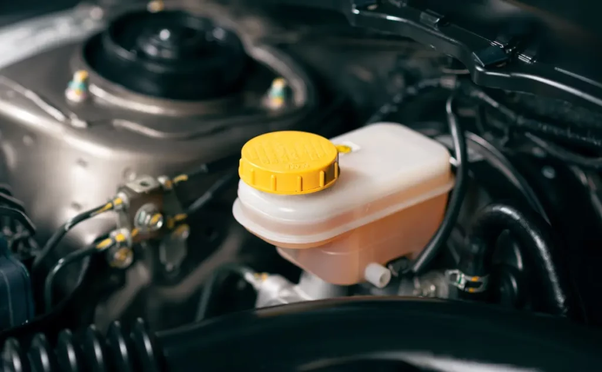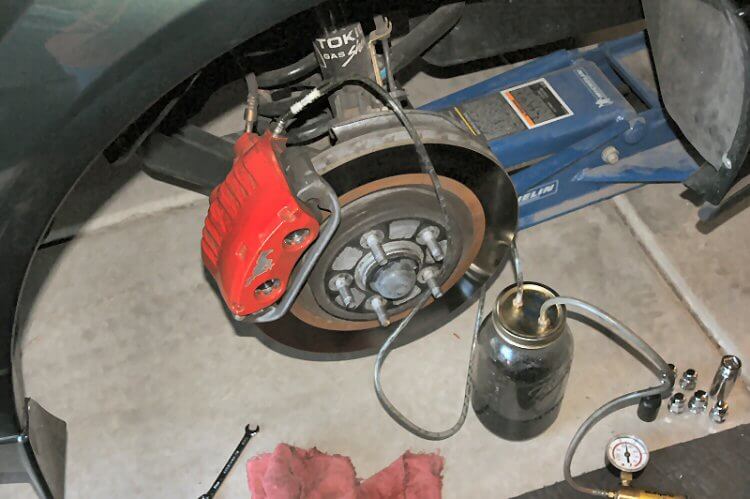Do you want to ensure confident braking performance, even on hot days?
Understanding how brake fluid works is key.
This guide explains why expansion isn’t a worry and looks into what truly affects your brakes.
You’ll learn how to maintain a safe and reliable braking system for you and your passengers.
Does Brake Fluid Expand And Affect Braking?
The answer is no, brake fluid is specifically chosen for its incompressible properties.
Even when it heats up during braking, the volume change is minimal and won’t significantly impact the fluid’s ability to transmit pressure within the hydraulic braking system.
Here’s a quick breakdown of how it works:
When you press the brake pedal, you apply force to a piston in the master cylinder.
This force is transmitted through nearly incompressible brake fluid to pistons in the brake calipers at each wheel.
These pistons squeeze the brake pads against the discs (rotors), creating friction that slows your car down.
Because brake fluid is incompressible, the pressure you apply to the pedal gets transmitted directly to the calipers, regardless of the fluid’s temperature.
This ensures that you get a firm and consistent brake pedal feel, even during hard braking or hot weather driving.
In other words, brake fluid expansion won’t cause your brakes to feel soft or spongy.
However, other factors can affect braking performance, such as worn brake pads or air in the brake lines.
If you ever experience changes in your brake pedal feel, it’s important to have your brakes checked by a qualified mechanic.
What happens when brake fluid gets too hot? While expansion isn’t a major concern, brake fluid does have a boiling point.
If the fluid gets too hot, it can boil and create air bubbles in the system, leading to a spongy pedal and potential brake failure.
This is why it’s important to use the correct type of brake fluid for your car and to flush the brake fluid regularly according to your vehicle’s maintenance recommendations.
Can air in brake lines cause spongy brakes? Yes, the air in the brake lines can compress more easily than fluid, leading to a soft or spongy brake pedal.
What Happens When Brake Fluid Gets Too Hot?

Brake fluid is engineered to withstand high temperatures, but there is a limit.
If your brakes get extremely hot, the brake fluid can reach its boiling point and start to boil.
This can be a serious safety concern because boiling brake fluid can lead to brake failure.
When brake fluid boils, it turns into a gas.
Unlike a liquid, gas is much more compressible, so when you press on the brake pedal, the pressure isn’t efficiently transferred through the system to the brakes.
Instead, the compressible gas bubbles absorb the pressure, resulting in a spongy brake pedal.
You might press down on the pedal further and further, but your car won’t slow down as effectively as it should.
In the worst-case scenario, you could experience complete brake failure.
Warning Signs Of Overheating Brakes:

- Spongy brake pedal: If your brake pedal feels soft and mushy when you press on it, it could be a sign that the brake fluid is boiling.
- Burning smell: If you smell a burning odor coming from your brakes, it could be a sign that they are overheating.
- Reduced braking power: If you notice that it takes longer than usual to stop your car, it could be due to overheating brakes.
Don’t ignore these warning signs, If you suspect your brakes are overheating, pull over to a safe location as soon as possible and turn off your engine.
Do not attempt to drive further, call a tow truck, or have your car safely transported to a mechanic for immediate inspection.
However, there are a few ways to prevent brake fluid from boiling.
Using the correct type of brake fluid for your car (a higher DOT rating indicates a higher boiling point) and maintaining a regular flush schedule are essential.
Additionally, avoiding excessive braking, especially on steep downhills, and driving habits that contribute to overheating (like riding the brakes) can help.
While a burning smell can be a sign of low brake fluid, it’s more likely caused by overheating brakes.
Low fluid typically results in a warning light on your dashboard but may not produce a burning odor.
When Should I Flush My Brake Fluid?

Regular brake fluid flushes are an important part of maintaining a safe and healthy braking system.
Brake fluid absorbs moisture from the air over time.
This moisture contamination can lead to two problems:
- Lower boiling point: Brake fluid has a boiling point, and when it gets too hot, it can start to boil. Moisture contamination lowers that boiling point. If the boiling point gets too low, the brake fluid can boil under extreme conditions, leading to brake failure (as discussed earlier).
- Corrosion: Moisture in the brake fluid can also contribute to corrosion inside the brake system’s metal components. This corrosion can damage parts and lead to leaks or even brake failure.
So, how often should you flush your brake fluid?
The recommended service intervals for brake fluid flushes can vary depending on your car’s make and model, your driving habits, and the environment you drive in.
For most vehicles, a good rule of thumb is to flush your brake fluid every 2-3 years or 30,000 miles, whichever comes first.
However, it’s always best to consult your car manufacturer’s recommended maintenance schedule for specific details.
You can usually find this information in your owner’s manual or online at the manufacturer’s website.
Warning signs that might indicate a needed brake fluid flush, even before the recommended interval, include:
- A spongy or soft brake pedal, even when the brakes are not overheating.
- A feeling that the brakes aren’t responding as well as they used to.
Flushing brake fluid can be a DIY project, but it does require some specific tools and knowledge.
If you’re not comfortable working on your car’s brakes, it’s always best to consult a qualified mechanic or brake service professional.
